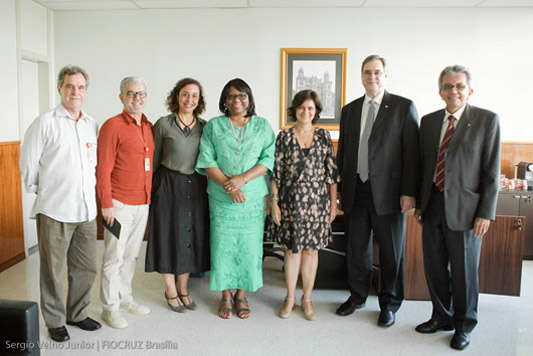Fiocruz and PAHO reaffirm collaboration in favor of health

08/06/2018
Cecília Lopes (Fiocruz Brasília)
The strategic collaboration between the Pan American Health Organization (PAHO) and Fiocruz, the expanded concept of health, and the establishment of a Health Commission by PAHO to discuss the Alma Ata gaps were the main issues of the meeting between Carissa Etienne, PAHO Director General, and Nísia Trindade Lima, president of Fiocruz, on March 13, at Fiocruz Brasilia.
Trindade Lima pointed out that the Unified Health System (SUS) is celebrating its 30th anniversary this year, and the joint work between PAHO and Fiocruz over the decades has been strategic for the preservation and advancement of health programs in Brazil. "Fiocruz and its units are mobilized for the 2030 Agenda and we can organize the various levels of our collaboration in this regard", she said.
Etienne thanked the collaboration with Fiocruz, "an institution of historical reputation", and said that having former PAHO employees within Fiocruz staff is a real advantage that strengthens the work of both institutions. "We need to organize working groups to explore creative ways for our collaboration", she suggested.
The director reported her "passion" for primary care and recalled that the 40 years of Alma Ata are also celebrated in 2018. "I believe that primary care is the driving force behind all health systems", she said. PAHO convened a Health Commission, chaired by the former President of Chile, Michelle Bachelet, to verify implementation gaps of Alma Ata with a view to proposing solutions for expanding access to health in the Americas region. The results of the work of the Commission were presented on May at the World Health Assembly in 2019. "To achieve the goals that have not been achieved, research work is very important and we rely on Fiocruz", Etienne said.
The Alma-Ata Conference held in Kazakhstan in 1978 produced a consensus that Primary Health Care was the necessary means to achieve a global level of health that would allow the world's population to have a socially and economically active life.
Health as a public asset
Also present at the meeting were representative of PAHO in Brazil, Joaquim Molina; director of Fiocruz Brasília, Fabiana Damásio; advisors of the unit Gerson Penna and José Agenor Álvares; and the international coordinator of Fiocruz Brasília, José Paranaguá de Santana.
During the meeting, Trindade Lima also emphasized the importance of the collaboration with Bireme, the holding of Conferences on Collective Health and Tropical Medicine, the need to strengthen surveillance research, and the relevance of Fiocruz international organizations such as the Fiocruz Global Health Center (Cris/Fiocruz), coordinated by Paulo Buss, and the Center for Bioethics and Diplomacy Studies in Health (Nethis/ Fiocruz Brasília), coordinated by Paranaguá. Fabiana Damásio reinforced the need to gather in these spaces of the Foundation researchers from Fiocruz and other institutions that deal with emerging health issues at the international level.
When reporting the reflections developed in Nethis, Paranaguá regretted that the interests of country leaders are focused on what he called the "antithesis of health" such as war and trade disputes, and that it is important to regain health as a fundamental right of human beings. "The climax of the value of health was the creation of the World Health Organization (WHO) after World War II, and another culminating point was Alma Ata in 1978", he recalled. "I dare to propose that the two institutions take a stand in favor of health as a universal public asset”.
José Agenor, former Brazilian Health Minister, recalled a speech by then WHO Director-General Halfdan Mahler during the 7th National Health Conference (NHC) on the importance of political decision to overcome the gap between rich and poor in the access to health. "What really matters is people, it is the sentence that stood out from this Conference", he said.




